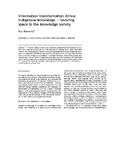| dc.contributor.author | Raseroka, K. | |
| dc.date.accessioned | 2010-06-08T10:04:29Z | |
| dc.date.available | 2010-06-08T10:04:29Z | |
| dc.date.issued | 2008 | |
| dc.identifier.citation | Raseroka, K. (2008) Information transformation Africa: indigenous knowledge - securing space in the knowledge society, The International Information and Library Review, Vol. 40, pp. 243-250 | en_US |
| dc.identifier.issn | 1057-2317 | |
| dc.identifier.uri | http://hdl.handle.net/10311/489 | |
| dc.description.abstract | This paper reflects on factors that need to be considered for establishment of an equitable
knowledge society that will secure the Indigenous Knowledge space. While information
communication technology facilitates the capture of a predominantly oral-based indigenous knowledge,
its contribution to exploitative approaches to information access, also encourages the development
of such knowledge as a commodity for competitive advantage, a factor that requires serious
consideration. The basis for this consideration should be the World Summit on the information
Society (WSIS) Principles which provide the promise of equitable access to information as a base
for creation of the knowledge society through ethically grounded information use and sharing.
ª 2008 Published by Elsevier Ltd. | en_US |
| dc.language.iso | en | en_US |
| dc.publisher | Elsevier, http://www.elsevier.com | en_US |
| dc.subject | Africa | en_US |
| dc.subject | Indigenous knowledge | en_US |
| dc.subject | Information transformation | en_US |
| dc.subject | knowledge | en_US |
| dc.subject | society | en_US |
| dc.title | Information transformation Africa: indigenous knowledge - securing space in the knowledge society | en_US |
| dc.type | Published Article | en_US |

